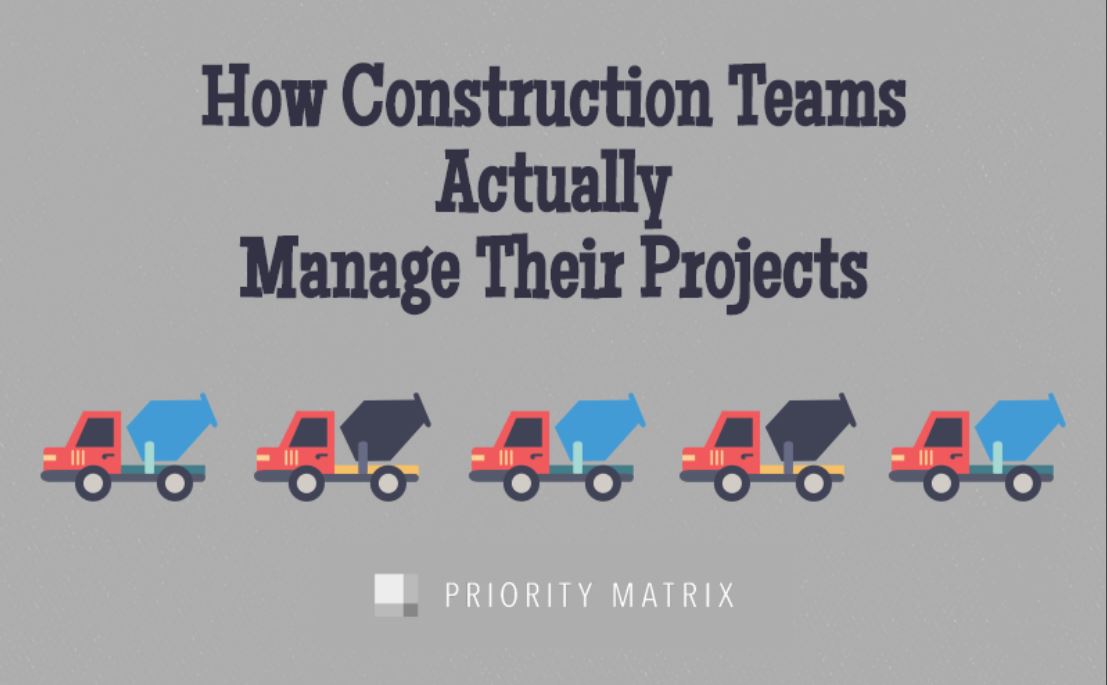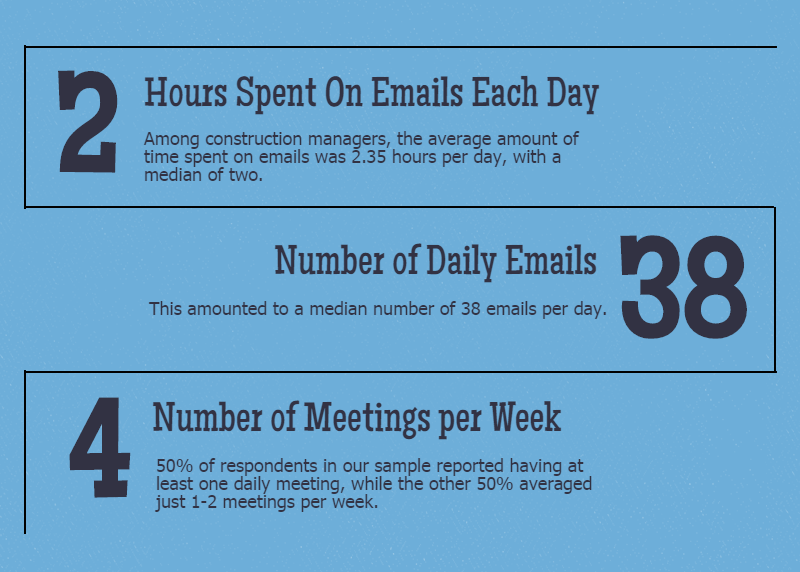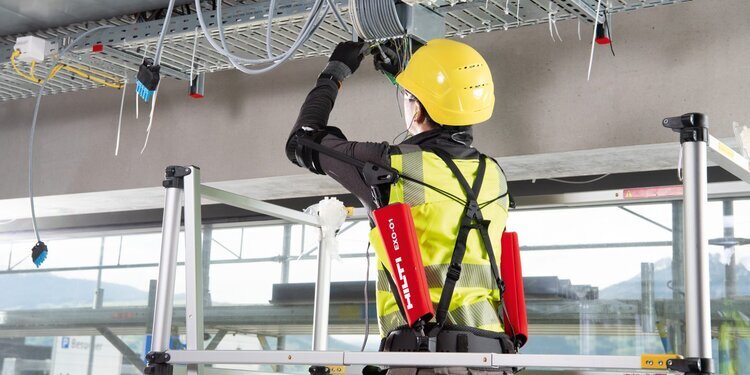Appfluence
The following is a guest post from Kari at Appfluence, maker of Priority Matrix, a priority management solution that helps construction teams execute more effectively, by centralizing project information and enhancing communication.
As a manager, it’s not uncommon to ask yourself, ‘am I doing this right?’ Even the most experienced managers in the construction industry consistently strive to learn different methods of management that allow them to increase their team efficiency and deliver more successful projects.
However, without a benchmark to compare themselves to, it’s hard to know if what you’re doing is ‘normal’ or working as effectively possible.
Here at Appfluence, we set out to find the answers.
We surveyed 20 Construction Project Managers, along with a 5 senior-level and VP-level managers from construction firms across the country. In this article, we’re explore how they run their projects, from the number of meetings and emails they deal with each week, to the software they use, and their best advice for success.
Emails and Meetings: A Necessary ‘Evil’
Emails
Among Construction Managers, the average amount of time spent on emails was 2.35 hours per day, with a median of two. This amounted to a median number of of 38 emails per day. Compared with project managers, this information provides an interesting contrast, as it is notably lower. For reference, project managers handled a median number of 50 emails per day, or 3 hours of time communicating with their team via email (source).
The difference can likely be explained by the fact that construction managers spend significantly more time in the field than project managers, and thus have less access to their email throughout the day. As opposed to project managers, who reported spending the day frequently checking their email, the best practice among construction managers is blocking out time either before or after heading to the jobsite to catch up on correspondence.
Among construction teams, some of the main frustrations expressed were the tedious process of digging through stale emails to find an important document, or information falling through the cracks due to an un-responded message.
If your inbox is overwhelming you, try carving out an extra 20 minutes at the end of each day to make sure everything is both well-organized and responded to.
Meetings
When it comes to meetings, the median amount of meetings Construction Managers reported having per week came in at 4. While 50% of respondents in our sample reported having at least one daily meeting, the other 50% averaged just 1-2 meetings per week.
Interestingly enough, those managers who had more weekly meetings also sent a higher median number of emails. When broken into two groups, the managers who held one or more meeting per day also sent approximately 16 more emails than the group with lesser meetings – 46 vs. 30.
This could be a signal that those managers who hold more meetings are also more communicative. For those with email envy, it could be beneficial to heed the advice of Steve Bergeron of AECOM, who told us he only sends around 4 emails a day ‘with clear verbal direction and documented minutes of meetings’.
However, while less meetings do sound nice, as Quinn Westmoreland from Brahma Group pointed out, “sometimes in person, face to face is still the best way to communicate.” In this case, the goal should not be simply to reduce the number of meetings, but to find the most efficient way to share information. This could mean making meetings more efficient, or exploring alternate forms of communication.
Document Management
It’s no secret that a large part of managing a construction project includes handling hundreds of documents, which change hands on a constant basis. However, although the need for management of construction documents is ubiquitous in the construction industry, according to our research, the practices for doing so still vary widely depending on company size, among other factors.
Out of 20 teams who responded to the question ‘what is your best practice for keeping project documents accessible to the people who need them?’ 9 reported that they rely exclusively on software to get the job done. Of those 9, the most popular answers were cloud services like Box, Dropbox, and Sharepoint. Only two teams stated that their main method of document management was handled by more robust software such as Procore.
Among 7 teams who don’t rely on any software to manage their documents, 4 reported that their go-to method is a shared server with project folders accessible to those working on certain jobs.
Finally, 4 teams responded that their process includes both a formal software solution designed for document management, along with proprietary shared drives and servers.
However, as John Golly, Senior Construction Manager at AdvanceTEC points out, “we have so much technology available to us that the biggest challenge is making sure those involved in the process are participating.”
I had the chance to speak on the phone with Brett Brenize of Gannett Fleming who shared his well-thought-out process for resolving this issue. In Brett’s team, like a number of others, there is an administrator whose full role is to enter documents into their system, track when documents change hands, remind responsible parties of deadlines, and report on document status. This statement rang true with a few other teams, who reported that project administrators are often the point person when it comes to making sure things are in the right place, whether that be a shared folder or a software solution.
In teams using a software with no physical document manager, a number of construction managers reported they follow up on document transfers with phone calls or emails. For many teams it seems, simply using software isn’t enough. There must be a human component
Project Management Software for Construction Teams
Of 26 teams in our survey, when asked, “do you use any project management software?” 18 reported relying on commercial software to get the job done, while 5 used in house solutions, and 2 teams said they weren’t using any solution at all.
When prompted to further specify which exact tools they are using to manage team operations, just 22 provided more details. Among just the 22 teams who responded to the question, there were a total of 33 different software listed among the answers.
Coming in the #1 slot, out of 22 responding teams, 8 reportedly use Primavera. The next-runner-up was Excel, followed by Procore and Microsoft Projects. Finally, aside from the overlap with Primavera and Procore, and MS Projects, almost no two teams on the list reported using the same software.
So, while many robust software solutions claim to be a one-punch solution for construction projects, it appears that most teams relied on more than one software, and further, no two teams used a similar set of tools.
Tips and Best Practices for Construction Managers:
At the end of the day, managing construction projects requires a technical skill set that is typically used in conjunction with a set of software tools that help things run more efficiently. However, when asked for their tips and best practices, construction managers we surveyed left technicalities aside and offered up the following:
- That the best way to achieve schedule and maintain budget is a strict adherence to quality and business procedures, and only working with subcontractors who adhere to the same values. -Dominic Santos, CDM Smith
- Get the most experienced craftsmen you can. -Ike, AECOM
- Plan ahead. -Nick Sleboda, Wight Construction
- Stay calm and in your element! Always take any education that is offered. Check your work before you send out bids. Talk to the general and the subs as there is always something you can learn. -Jim Peacock, O’Connor Construction Management
- It takes a TEAM to accomplish anything. We all have to work together toward the end goal or else it is a disaster. -Quinn, Brahma Group
- Balance expectations with ability, and seek to understand and develop people instead of change them. -Cory, Company Not Given
- Communication is the key to a successful project and project team. -Cyle Coles
- Be flexible and never take yourself too seriously. -Chris Burun, Stahl Companies
- It’s important to know your drawings and specs. -Stacy, AECOM
- Relationships are everything. -John Walls, Shea Homes
- Construction management is all about knowing who to ask for help. You cannot know everything about construction. -Carolyn Bonaventura, CDM Smith
- People are your greatest asset. -Steve Bergeron, Jacobs Field Services
- Detail, Detail, Detail. Things don’t just magically happen, although sometimes it seems that way. It’s the little things that can make or break the success of your project. It’s the little things that seem to fall through the cracks. So, don’t lose sight of the little things and be sure to communicate those little things to your team. “Many hands make light work”. Same thing applies to managing the little things. Do it as a team. Makes it easier to manage that way and engages others. -John Golly, AdvanceTEC
- Every issue one encounters may have a cost and schedule impact that needs to be monitored and managed in order to have a successful project. -Ken Rock, Tishman Speyer
- Treat contractors the way you want to be treated. Be firm but fair with them. -Dennie Ashby, Site Manager
- Projects that are truly successful to all parties are built by people who have placed significant focus on creating good relationships with each other and who foster positive constructive and proactive communication. -Brett Brenize, Gannett Fleming
- Your plan should be your gospel. Never throw away your plan when you hit a bump in the road. Figure out the detour, get around the bump, and get back on your plan! -Roger George, AECOM
- No one person builds a project, it takes a lot of people who need to be able to communicate, collaborate to solve problems and make the best informed decisions. As a GC, we rely on our trade partners to make the process successful. Building a solid plan and sticking to the plan is key. -Ricardo Khan, Mortenson Construction
- Time is of the essence and the Partnering process works. -Don, STV, Inc.
- Listen more and talk less. This works well in life as well. -Alex Ray, Smith, Seckman, Reid, Inc.
Conclusion
There is no magic recipe about how to effectively manage a construction project. However, by taking pointers from experienced industry professionals, we can deduce some best practices around emails, meetings, software usage, and general people management.
To resume what was discussed above:
Emails: If you find yourself dealing with more than about 40 emails per day, look for ways to cut back. One way to do this is make sure that each email contains clear, easy-to-follow instructions. This will reduce back-and-forth. For those of you spending too much time digging through your inbox, consider saving important correspondence and document as they are received in a system like Priority Matrix.
Meetings: While meetings can seem like a waste of time, as long as they are run efficiently, they are a great way to share information with your team. To get the most out of meetings, plan your meeting minutes according to pre-existing information about project status and close the meeting with clear action items for each individual.
Construction Document Management: Whether you’re using a software solution or simply shared folders to manage your documents, consider utilizing a project administrator to keep track of it all. If your projects aren’t large enough for a full-time person in this role, this position can act as the point-person for documents on number of projects for your firm simultaneously.
Project Management Software for Construction: Oftentimes, the software used on a project can be determined by factors outside of your control as a construction manager. However, the most important factor may not be the software itself, but earning your teams buy-in to use it consistently in order to keep information centralized in one place for quick access and effective operations.
If you have any best practices or tips to contribute when it comes to managing construction projects, we encourage you to contribute in the comments below!
















In the midst of fierce discourse over the bipartisan infrastructure bill lies a unique opportunity for the United States.